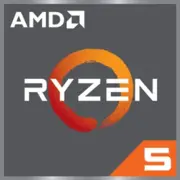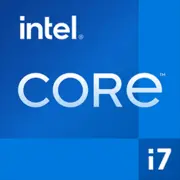Advantages
- Larger L3 Cache: 96MB shared (96MB shared vs 33MB)
- Higher Technology: 7 nm (7 nm vs 10 nm)
- More Total Cores: 20 (6 vs 20)
- Higher Performance-core Max Turbo Frequency: 5.6 GHz (4.4 GHz vs 5.6 GHz)
- Higher Memory Type: DDR5-5600 (DDR4-3200 vs DDR5-5600)
- Newer Launch Date: October 2023 (July 2023 vs October 2023)
Basic
AMD
Label Name
Intel
July 2023
Launch Date
October 2023
Desktop
Platform
Desktop
Ryzen 5 5600X3D
Model Name
?
The Intel processor number is just one of several factors - along with processor brand, system configurations, and system-level benchmarks - to be considered when choosing the right processor for your computing needs.
i7-14700K
Vermeer
Code Name
Raptor Lake Refresh
TSMC
Foundry
-
Ryzen 5 (Zen 3 (Vermeer))
Generation
-
CPU Specifications
6
Total Cores
?
Cores is a hardware term that describes the number of independent central processing units in a single computing component (die or chip).
20
12
Total Threads
?
Where applicable, Intel® Hyper-Threading Technology is only available on Performance-cores.
28
-
Performance-cores
8
-
Efficient-cores
12
3.3 GHz
Performance-core Base Frequency
3.4 GHz
-
Efficient-core Base Frequency
2.5 GHz
4.4 GHz
Performance-core Max Turbo Frequency
?
Maximum P-core turbo frequency derived from Intel® Turbo Boost Technology.
5.6 GHz
64K per core
L1 Cache
80K per core
512K per core
L2 Cache
28MB
96MB shared
L3 Cache
33MB
AMD Socket AM4
CPU Socket
?
The socket is the component that provides the mechanical and electrical connections between the processor and motherboard.
LGA-1700
100MHz
Bus Frequency
-
33.0
Multiplier
-
No
Unlocked Multiplier
-
7 nm
Technology
?
Lithography refers to the semiconductor technology used to manufacture an integrated circuit, and is reported in nanometer (nm), indicative of the size of features built on the semiconductor.
10 nm
105 W
TDP
125 W
-
Max. Operating Temperature
?
Junction Temperature is the maximum temperature allowed at the processor die.
100°C
4
PCIe Version
?
PCI Express is a high-speed serial computer expansion bus standard used for connecting high-speed components, replacing older standards such as AGP, PCI, and PCI-X. It has gone through multiple revisions and improvements since its initial release. PCIe 1.0 was first introduced in 2002, and in order to meet the growing demand for higher bandwidth, subsequent versions have been released over time.
-
Memory Specifications
DDR4-3200
Memory Type
?
Intel® processors come in four different types: Single Channel, Dual Channel, Triple Channel, and Flex Mode. Maximum supported memory speed may be lower when populating multiple DIMMs per channel on products that support multiple memory channels.
DDR5-5600
-
Max Memory Size
?
Max memory size refers to the maximum memory capacity supported by the processor.
192GB
2
Memory Channels
?
The number of memory channels refers to the bandwidth operation for real world application.
2
51.2 GB/s
Max Memory Bandwidth
?
Max Memory bandwidth is the maximum rate at which data can be read from or stored into a semiconductor memory by the processor (in GB/s).
-
Yes
ECC Memory Support
-
GPU Specifications
N/A
Integrated Graphics Model
?
An integrated GPU refers to the graphics core that is integrated into the CPU processor. Leveraging the processor's powerful computational capabilities and intelligent power efficiency management, it delivers outstanding graphics performance and a smooth application experience at a lower power consumption.
True
Miscellaneous
20
PCIe Lanes
-
Benchmarks
Cinebench R23 Single Core
Ryzen 5 5600X3D
1374
Core i7-14700K
2223
+62%
Cinebench R23 Multi Core
Ryzen 5 5600X3D
10027
Core i7-14700K
37013
+269%
Geekbench 6 Single Core
Ryzen 5 5600X3D
2089
Core i7-14700K
2936
+41%
Geekbench 6 Multi Core
Ryzen 5 5600X3D
9119
Core i7-14700K
20992
+130%
Geekbench 5 Single Core
Ryzen 5 5600X3D
1595
Core i7-14700K
2185
+37%
Geekbench 5 Multi Core
Ryzen 5 5600X3D
8392
Core i7-14700K
22625
+170%
Passmark CPU Single Core
Ryzen 5 5600X3D
3218
Core i7-14700K
4479
+39%
Passmark CPU Multi Core
Ryzen 5 5600X3D
22115
Core i7-14700K
53645
+143%
Blender
Ryzen 5 5600X3D
160
Core i7-14700K
472
+195%
Share in social media
Or Link To Us
<a href="https://cputronic.com/cpu/compare/amd-ryzen-5-5600x3d-vs-intel-core-i7-14700k" target="_blank">AMD Ryzen 5 5600X3D vs Intel Core i7-14700K</a>






